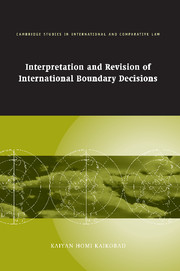Book contents
- Frontmatter
- Contents
- List of maps
- Preface
- Acknowledgments
- Table of cases
- List of abbreviations
- Part I Introduction
- Part II The settlement of territorial and boundary disputes
- 2 Problems in settlement
- Part III Judicial remedies: interpretation
- Part IV Judicial remedies: revision
- Part V Conclusions
- Select bibliography
- Index
- CAMBRIDGE STUDIES IN INTERNATIONAL AND COMPARATIVE LAW
2 - Problems in settlement
Published online by Cambridge University Press: 14 September 2009
- Frontmatter
- Contents
- List of maps
- Preface
- Acknowledgments
- Table of cases
- List of abbreviations
- Part I Introduction
- Part II The settlement of territorial and boundary disputes
- 2 Problems in settlement
- Part III Judicial remedies: interpretation
- Part IV Judicial remedies: revision
- Part V Conclusions
- Select bibliography
- Index
- CAMBRIDGE STUDIES IN INTERNATIONAL AND COMPARATIVE LAW
Summary
Preliminary observations
The significance of territory in international law and relations is best described as being multi-dimensional, as opposed to multi-layered, in character. The distinction between the two ideas is predicated on the view that the latter conveys a notion of discrete strata lying one on top of the other, whereas the imagery of a multi-dimensional notion is more consistent with one in which a number of aspects, interests and considerations are interconnected in a composite whole. Clearly, the political significance of territory to a State lies at the very heart of the whole idea of statehood. Not only is territory the spatial extent of the existence of the State, the extent of territory is directly linked to the vital national interests thereof, that is, the interests of defence, security and, indeed, the survival of the State itself. It is, perhaps, crude to equate the extent of territory to the power and strength of the State, where the logic of the analysis dictates that the greater the extent of territory the greater the State's power.
Yet, this crude analysis of power is neither totally exaggerated nor totally untrue. For the bigger States do seem to enjoy a degree of security to which smaller States can only aspire. The sheer territorial magnitude of China and India is itself a bulwark against any adventurous use of armed force against them, their nuclear weapons notwithstanding. For this very reason, any diminution of territory is seen as a threat to security.
- Type
- Chapter
- Information
- Publisher: Cambridge University PressPrint publication year: 2007

